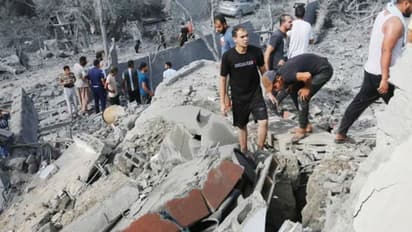Intense Israeli military operation in Gaza Strip leaves over 7,000 dead in 19 days

Synopsis
The Gaza Strip experiences a 19-day Israeli military operation targeting Hamas militants. Extensive airstrikes cause destruction and loss of life. Israel seeks to secure the release of over 200 hostages, communicating with Gazans for information. Meanwhile, Gaza faces severe shortages of food, water, and medical resources, exacerbated by Israeli restrictions. The conflict has resulted in thousands of casualties.
The Gaza Strip has experienced a significant military operation by the Israeli army over the past 19 days. This operation aims to address the presence of Hamas militants, who were responsible for the loss of more than 1,400 lives within the region's borders on August 7.
The Israeli military has conducted extensive airstrikes in both the northern and southern areas of Gaza, including the major city of Rafah, resulting in the destruction of numerous buildings. Tragically, the airstrikes have led to the loss of many lives, turning the region into a sombre and tragic place, and highlighting the devastating impact of the ongoing conflict.
Israeli Army conducts late-night 'targeted raid' in Gaza with tanks | WATCH
The Israel Defense Force (IDF) has conducted airstrikes since Tuesday night, targeting areas where Hamas militants are believed to be hiding or storing weapons. These airstrikes aim to prevent the militants from leaving those locations.
The Israeli army is actively working to secure the release of more than 200 hostages who are believed to be with Hamas militants. They have been communicating with the Palestinian population along the Gaza border, asking for information about the hostages. The army has assured that the identity of those providing information will be kept confidential, and they are offering financial assistance.
Israel-Palestine conflict: Here's how a 9-day-old infant survived brutal Hamas attack at Kibbutz Nirim
Meanwhile, activists engaged in relief efforts have expressed deep concerns as millions of people in the Gaza Strip are grappling with severe shortages of food, water, and essential medical facilities. This crisis has intensified over the past two weeks since the Israeli government halted the supply of vital resources such as food, fuel, and electricity to the region.
Additionally, the ongoing airstrikes and fuel scarcities have led to a situation where one out of every three hospitals in Gaza has been forced to cease operations. Consequently, the plight of the injured and war victims has become even more distressing.
'Look how many Jews I killed; Mom, your son is a hero...' IDF releases chilling audio of Hamas terrorist
Israel’s foreign minister Eli Cohen has informed the United Nations Security Council that the correct retaliation to the Hamas attack on October 7th is to kill every last Hamas terrorist. It is not a right, but a duty of every Israeli.
Meanwhile, the attempt of the Hamas terrorist group, which was trying to enter the country's border through swimming, was successfully prevented. In addition, the Israeli army has informed that the military infrastructure of Syria, which had attacked it recently, was destroyed by the attack.
Israel-Palestine war: Preparing for ground invasion of Gaza to wipe out Hamas, says Netanyahu
The decision for a ground attack in Israel has been left to Israel, according to President Joe Biden. In response to whether he would advise Israel to postpone the ground attack on Gaza, Biden stated that it's up to Israel to make that decision. He added that they have received the green signal for a ground attack, and the advice from the U.S. is for them to proceed with caution.
The Israeli army has employed a staggering 12,000 tons of heavy explosives in its continuous assault on the Gaza Strip over the past two weeks, as reported by the media office of the Gaza government. The intensity of these explosions is compared to the devastating U.S. bombing of Hiroshima, Japan in 1945. The Israeli army's attack is said to have used 33 tons of explosives for every square km. This ongoing conflict has tragically claimed the lives of over 7,000 individuals so far.
Check the Breaking News Today and Latest News from across India and around the world. Stay updated with the latest World News and global developments from politics to economy and current affairs. Get in-depth coverage of China News, Europe News, Pakistan News, and South Asia News, along with top headlines from the UK and US. Follow expert analysis, international trends, and breaking updates from around the globe. Download the Asianet News Official App from the Android Play Store and iPhone App Store for accurate and timely news updates anytime, anywhere.